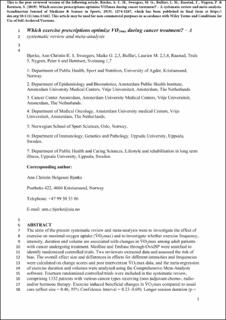Which exercise prescriptions optimize V̇O2max during cancer treatment?—A systematic review and meta‐analysis
Bjørke, Ann Christin Helgesen; Sweegers, Maike G.; Buffart, Laurien M.; Raastad, Truls; Nygren, Peter; Berntsen, Sveinung
Peer reviewed, Journal article
Accepted version
Permanent lenke
https://hdl.handle.net/11250/2647067Utgivelsesdato
2019Metadata
Vis full innførselSamlinger
Originalversjon
Bjørke, A. C. H., Sweegers, M. G., Buffart, L. M., Raastad, T., Nygren, P. & Berntsen, S. (2019). Which exercise prescriptions optimize V̇O2max during cancer treatment? – A systematic review and meta‐analysis. Scandinavian Journal of Medicine & Science in Sports, 29(9), 1274-1287. doi: 10.1111/sms.13442Sammendrag
The aims of the present systematic review and meta‐analysis were to investigate the effect of exercise on maximal oxygen uptake (VO2max) and to investigate whether exercise frequency, intensity, duration, and volume are associated with changes in VO2max among adult patients with cancer undergoing treatment. Medline and Embase through OvidSP were searched to identify randomized controlled trials. Two reviewers extracted data and assessed the risk of bias. The overall effect size and differences in effects for different intensities and frequencies were calculated on change scores and post‐intervention VO2max data, and the meta‐regression of exercise duration and volumes was analyzed using the Comprehensive Meta‐Analysis software. Fourteen randomized controlled trials were included in the systematic review, comprising 1332 patients with various cancer types receiving (neo‐)adjuvant chemo‐, radio‐, and/or hormone therapy. Exercise induced beneficial changes in VO2max compared to usual care (effect size = 0.46, 95% Confidence Interval = 0.23‐0.69). Longer session duration (P = 0.020), and weekly duration (P = 0.010), larger weekly volume (P < 0.001), and shorter intervention duration (P = 0.005) were significantly associated with more beneficial changes in VO2max. No differences in effects between subgroups with respect to frequency and intensity were found. In conclusion, exercise has beneficial effects on VO2max in patients with cancer undergoing (neo‐)adjuvant treatment. As interventions with larger exercise volumes and longer session durations resulted in larger beneficial changes in VO2max, exercise frequency, intensity, and duration should be considered carefully for sufficient exercise volume to induce changes in VO2max for this patient group.
